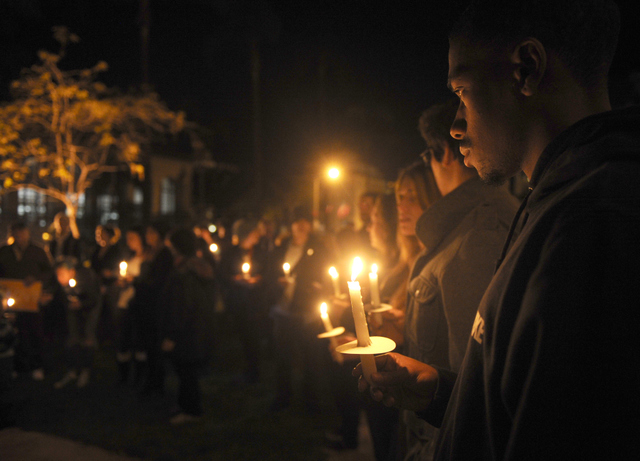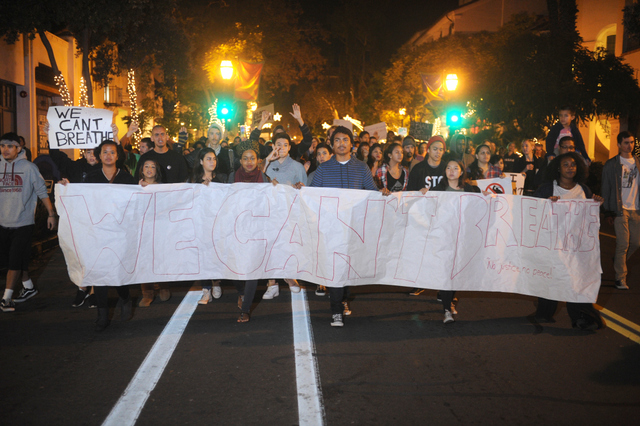Vigil and March for Eric Garner
Santa Barbara Protests Police Brutality

A crowd of more than 100 people spent three hours in downtown Santa Barbara Sunday night to peacefully protest a grand jury decision not to indict a police officer involved in the chokehold death of Eric Garner in New York. The rally against police brutality was the second held in two weeks in Santa Barbara. Feelings of contention and solidarity alike were present as participants marched, spoke through bullhorns, read poems, and chanted phrases that have been iterated online and in cities across the nation in recent weeks.
Trending on social media, the hashtag “Black Lives Matter” has prompted some backlash and sparked the creation of “All Lives Matter.” In his opening remarks, rally organizer Martin Leyva touched on that debate, arguing, “Of course all lives matter, but let us not dismiss the fact that this has to do with our black brothers and sisters across the nation.” Another speaker likened the problem of police brutality toward blacks to the drought — it is a problem that exists but not everyone recognizes it, he said. “There’s still water running through our faucets,” the speaker said, eliciting cheers from the crowd.

The group spent about an hour at the courthouse before marching down State Street to City Hall, stopping traffic and prompting some drivers to honk their horns. The decision to march to City Hall, Levya said, was a symbolic gesture as the local elected officials are the ones with control over the police department. The event was smaller than the one held on November 25 — after the announcement that a grand jury would not indict a police officer who shot and killed Michael Brown — when an estimated 500 people marched through the streets, assisted by police officers on motorcycles. On Sunday night, police on bikes and motorcycles were standing by, but there was less interaction between the police and protesters than on November 25, and the overall police presence seemed lighter.
Speaking at the courthouse, Santa Barbara pastor David Moore stood next to his son as he told the crowd, “Both of us have had unpleasant experiences [Santa Barbara police].” But, he added, “We’re not here to bash them. We’re here to hold them accountable.”
Moore told a story of when he first moved to Santa Barbara. His friends told him that the police knew every black man in town. Moore laughed them off, but he was shocked when a police officer followed him as he walked up to an ATM one day. The officer asked him what he was doing, and then followed him back to his office, where he asked him to show his license. The officer kept it for a few minutes before he gave it back, Moore said. He added, “From there, it did not get better.”
Several others reiterated that police treat whites and blacks differently. “If you are stopped by a police officer, your heart is not going to be pounding if you are white,” a speaker said.
Noting the small percentage of black people who live in Santa Barbara and the high number of white people in the crowd Sunday night, several people expressed a desire to hear black voices, an issue that became heated a couple of times. Community activist and libertarian Brandon Morse, who is white, ascended the City Hall steps and read a speech from his cell phone, quoting Martin Luther King Jr. and speaking about local police matters such as the death of Brian Tacadena, who was shot and killed by a police officer last year on Labor Day weekend. A few people interrupted Morse, calling for him to get off the steps. The matter was quelled after a few others stuck up for him.
Another point of contention emerged when a young black man asked every black man in the audience to raise their hand, declaring they were the key victims of police brutality. A young black woman took the mic right after him and contended that women of color are also deeply affected by this issue.
A number of students from the Black Student Union at UCSB attended the vigil and march. JeVins Hale, a 23-year-old UCSB student, spoke about a t-shirt brand he created when he was 15 years old called “You’re Not About that Lifestyle.” His idea, he explained, was to help get his friends who were dealing drugs to sell t-shirts instead. “They have skills,” he said. “They’re great at selling things.” Within a month, his friends had made 3,000 t-shirts. He continues to spread the brand to underprivileged communities in California. (Click here to see his website).
Keith Terry, who has worked to empower young men through ySTRIVE for more than a decade, made a case for continuous action in addition to the rallies. “In this town, it seems that folks will march down the street, but when it comes to doing actual work, you can’t find anyone,” he said.



